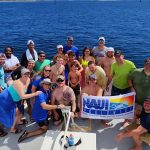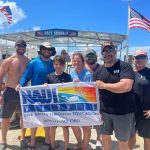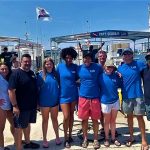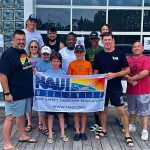Openwater Diver
Openwater Scuba Diver
Your Underwater Adventure begins here! Imagine watching the water level move up your mask as you slowly go below the surface – and continue to breathe! It’s the most exciting feeling imaginable when you become a NAUI Openwater Scuba Diver. The minimum age for Openwater scuba diver is 15 years old. Don’t worry ages 10 – 14 can complete the class as a Junior Openwater Scuba Diver and dive with a parent or legal guardian. Candidates for Openwater Scuba Diver must be in good physical condition to train.





Step 1: Paperwork
Every diver must fill out a NAUI liability waiver prior to a certification class or a dive trip. Please read and sign this form and bring it with you to class. A NAUI/DAN medical release form is required prior to any class/ dive trip or any time you’re medical information has changed.
Step 2: E-Learning
NAUI E-Learning is an online self-paced learning environment for students to learn the fundamentals of Scuba. You will need to create an account including a photo of yourself. This must be completed prior to classroom sessions. During our classroom session we will discuss what you learned, have open dialog to confirm understanding of the materials, and review any missed questions from the final test.
Step 3: In-Person Class
While eLearning is becoming a new norm in today’s society, there is still no substitute for gaining face to face time with students and re-affirming knowledge while conveying experience. Students will discuss what they learned with their instructors, meet the UA staff, learn from hands on activities, and gain real world experience. Classroom sessions consist 3 hours on Tues, Thurs, and Friday. Please insure that you have printed a copy of the dive tables and dive planner for class. This must be completed prior to classroom sessions. During our classroom session we will discuss what you learned and have open dialog to confirm understanding of the materials.
Step 4: Pool Sessions
Now for the fun! After you have completed in-person class and passed your e-learning exams we bring you to one of our partnering pools for 2 – 8 hour days. During these two days you will learn all of the skills you need to become a certified scuba diver from the basics to self rescue. There will be a pool exam which you must pass to move on. If you want or need more time after sunday, don’t fret, we run classes monthly.
Step 5: Checkout
Once you have successfully completed you’re learning pool sessions and your instructor has given you a referral, you are free to complete a checkout trip with UA or as a Universal Referral. UA runs a monthly trip to Panama City Beach for anyone interested. We ask that you complete you’re checkout within 6 months of starting you’re e-learning so that information stays fresh in your mind. If you exceed 6 months you may be asked to complete a refresher class and/or pool session.
Step 6: Instructor Evaluations
Once your checkout is complete we will upload images from you dive trip for you to remember your dives with us by. We also ask that you fill out our anonymous instructor evaluation form so that we can learn if there was anything we can improve upon for future classes.
Extras
Frequently Asked Questions
Scuba certification generally costs anywhere from $500-$1500 from start to finish. That cost includes equipment, eLearning, instruction and checkout fees and may vary depending on student needs, attendance, and other factors.
Yes! You don’t have to be an athlete, but swimming and treading water is a required skill for all students entering Openwater Scuba.
Most people can SCUBA! There are a few notable reasons why someone may not be allowed to dive, such as surgery, medications, poor health, etc. Most people in good cardiovascular and respirator heath can be cleared to to dive. We may ask for a physicians sign off for certain ailments.
You will need some minimal personal gear:
Mask, Snorkel, Fins, Booties, Gloves, Weights and Belt, Regulator Mouthpiece, and SMB.
Gear is available for purchase or rental and is included with class fees.
Absolutely! If you would like private instruction and smaller class sizes we can accommodate this request. Private instruction may cost a bit more and we will have to work with our instructors schedules but we can make it happen.
We partner with Crawfish Aquatics, Mirabou Park, and several other local pools in Baton Rouge.
You absolutely can, but we don’t recommend it. Scuba diving is an extreme sport where specialized and comprehensive training has made it extremely safe. Plus wouldn’t you rather enjoy those two days on your vacation rather than sitting though classes?
While everything we do incurs some level of risk; due to extensive training and certifications Scuba diving is incredibly safe. You are 65x more likely to be injured fishing and 36x more likely to be injured playing golf than scuba diving. Dive Safety Through Education
Yes, at some point while diving you are likely to see a shark. Sharks typically do not harm humans while diving and shark attacks are very rare. Dogs, snakes, crocodiles, and horses cause more deaths yearly.
No, certification is NOT guaranteed. While most people can complete classes, Instructors reserve the right to withhold certification if they do no feel that you are or will be a safe diver.


